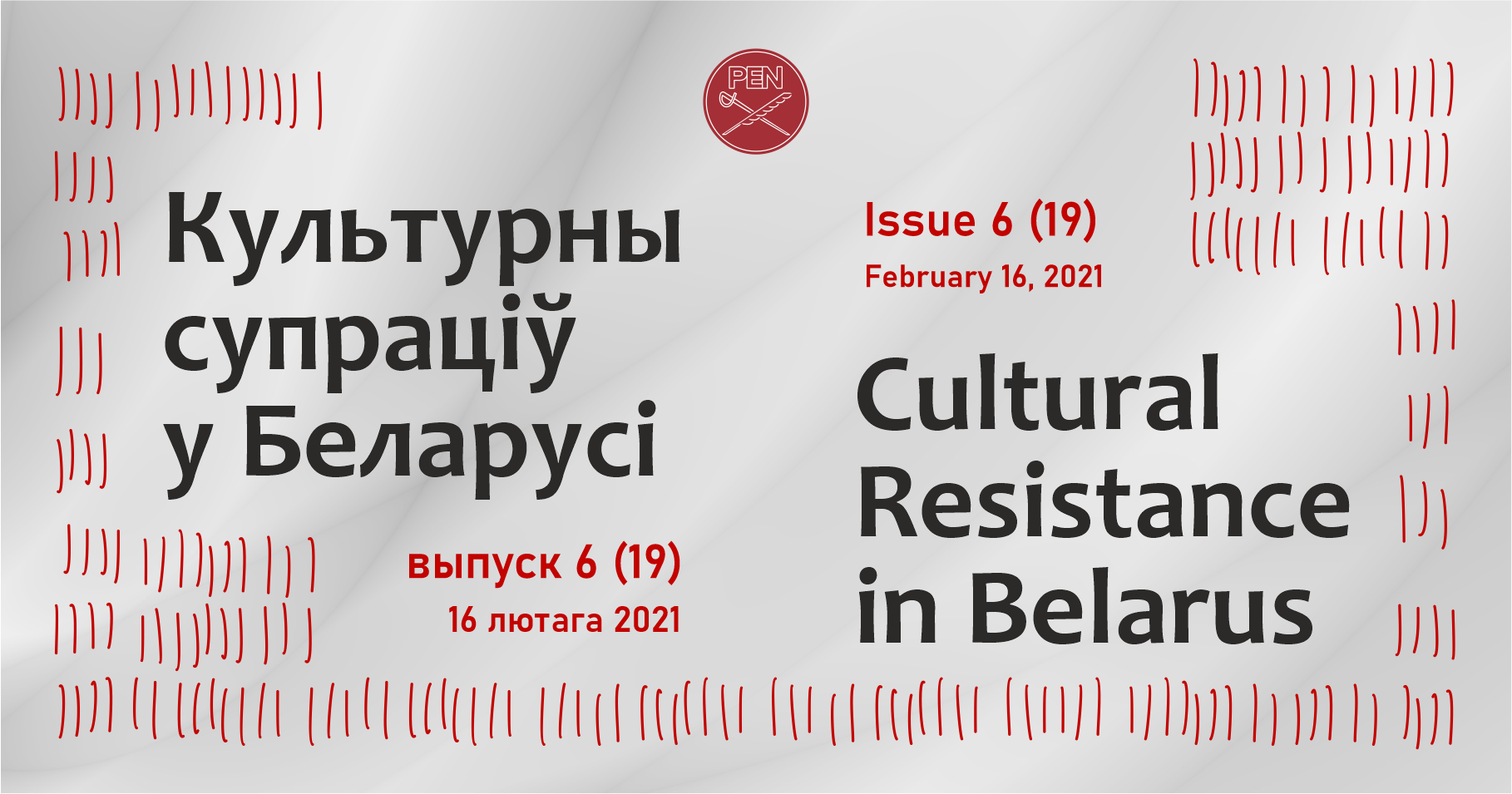
Stand with Belarusian Arts and Culture community. Donate to Save Our Songs campaign.
Arrests, Convictions, Prosecution
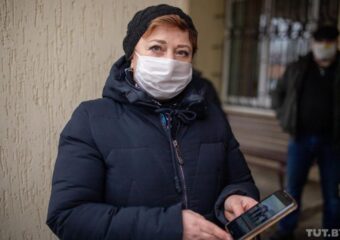
Žanna Babroŭskaja from Navahradak was convicted to 10 days of administrative arrest for wearing a yellow Jewish star on a tour of the city about the Halacaust; such tours became regular but people began to be detained.
Valancina Kryštopienka from Viciebsk, an individual with a disability of group 1, was fined 40 basic units [370 EUR] for a photo with a quote from the Bible: “When the wicked rule, the people groan.”
Maksim Znak and Maryja Kaleśnikava are facing new charges: “conspiracy in order to seize power” and “creation of an extremist group and its management” (from 8 to 12 years in prison).
Valer Jesipionak, the owner of the store “Moj Modny Kut”, who was to be released on February 12, after serving 15 days of arrest, was sentenced to another 5 days for alleged “disobedience during detention.”
Andrej Drahun, a musician who played at the Niamiha metro station in Minsk on February 11, was sentenced to 20 days in jail.
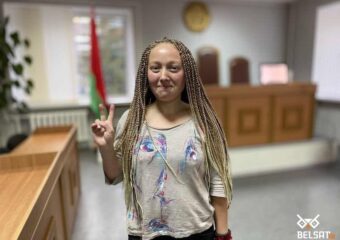
Volha Siemčanka, an employee of the Mahiloŭ Drama Theater, was detained on February 11 from her workplace for a “preventive talk“. Volha had been detained twice before.
Riot police broke into a secret concert of the band Raźbitaje Serca Pacana taking place near Smalavičy. 68 people were detained (including the underaged): among them Pavał Haradnicki (15 days of administrative arrest), Dzianis Tarasienka and Andrej Osipčyk (15 days of administrative arrest), musicians if the band, Anastasija Dol (fined for 30 basic units, [278 EUR]), the band’s manager, Uładź Lepiašynski (15 days of administrative arrest) and Valeryja Suravickaja (15 days of administrative arrest), musicians.
Pressure, Dismissal, Ban
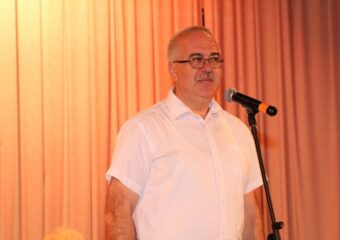
Alaksiej Saładuchin, director of the Hrodna Music College, was dismissed from his post. At the polling station where Alaksiej was chairman during the presidential election, Sviatłana Cichanoŭskaja won, and then he did not dismiss workers and did not expel students during the protests.
Nina Skrybec, from of Viciebsk, was first fined 1,450 BYN [460 EUR] for the picket which she didn’t participate in and then fired.
Aksana Hajko, head of the independent cultural space “Kryły chałopa” in Brest, accused of tax evasion on a large scale, comments on the closure of the space:
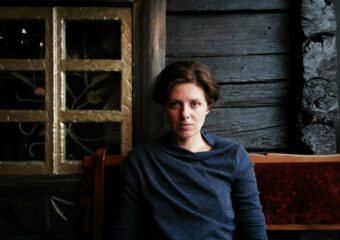
“They try to drive you into a corner so that people sit quietly like mice under a broom. Such conditions were created for us, it was impossible to work. When after the opening of Maksim Saryčaŭ’s exhibition “I can almost hear birds” representatives of the Ministry of Emergency Situations came to us, it became clear that it is not worth tempting fate.The next visitors to the gallery would likely be people in black masks”.
Pressure continues on the store “Prince Vitaŭt” in Brest, which sells products with national symbols. Another court hearing was held on February 11, after a number of inspections, as a result of which the store has to pay a fine of 5,800 BYN [1800 EUR] for violations that inspections usually turn a blind eye to. The pressure on the store started a year and a half ago for the T-shirts with the image of an “avtozak” (police van) with the line “Welcome to Belarus” on it, and intensified before the presidential election.
Hanna Zenina, a 13-year-old girl from Minsk who is learning to play the saxophone at a Minsk music high school, has been participating in the school brass quartet for several years. She refused to take part in the Young Talents of Belarus contest hosted by the First Channel of Belarusian Radio. She motivated her refusal by her civil position: she is opposed to the Belteleradiocompany’s position. The head of the quarter excluded her from participating in its activities.
Symbols
Several dozen people were fined or received administrative arrests for white-red-white colors and the Pahonia emblem over the week.
Alaksandr Maisiejeŭ, an assistant professor at the Department of General and Orthopedic Dentistry of Viciebsk State Medical University, was fired for “absenteeism” – he spent two days in the detention center as he had been detained for having white-red-white curtains in the windows of his apartment.
A modified photo of 1941 with a fascist swastika, which was initially black and white, appeared on the website of the newspaper “Soviet Belarus. Belarus Today”. In response, a petition was created, its author believes that the distortion of documentary evidence in the publication was made intentionally in order to create lasting negative associations with the white-red-white flag, and the caption under the photo with personal opinions of the author is aimed solely at forming in the reader a belief which diminishes the honor and dignity of the people and events that took place in our country under the white-red-white flag.
Barys Chamajda, a Viciebsk activist, was detained while distributing Belarusian publications under a white-red-white umbrella. He was warned that he would be detained every time he would show up with white-red-white symbols and fined, thus he would be deprived of his livelihood.
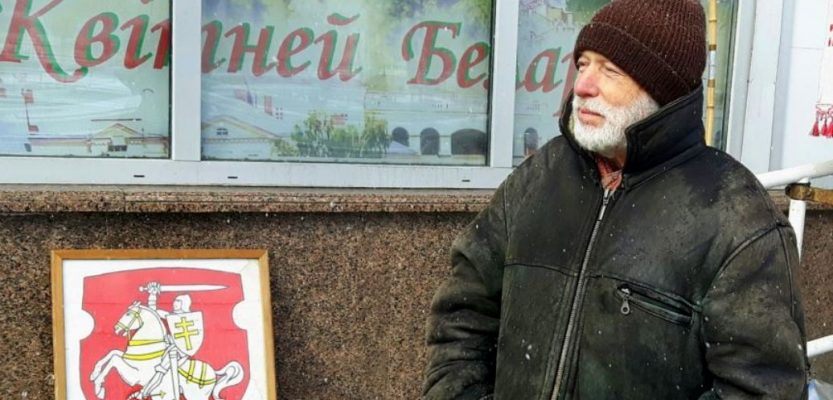
Cultural Resistance
Volny Chor performed a song “Prayer” off the poem by the Belarusian classic Janka Kupała (considered one of the greatest Belarusian-language writers of the 20th century).
In the new issue of the project “Words are more powerful” musician, poet, artist and TV presenter Andruś Takindanh, who in November 2020 spent 15 days in jail for performing at a neighbourhood concert, reads a poem by Paŭluk Šukajła.
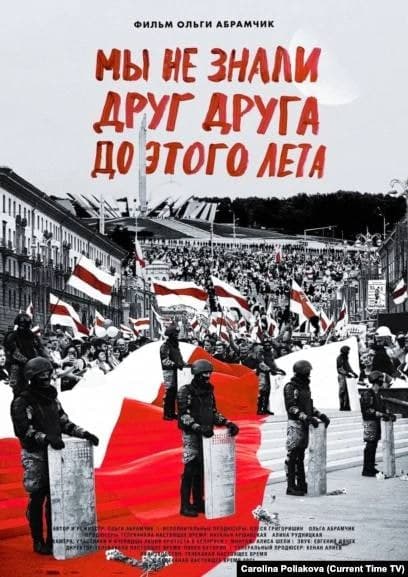 The premiere of the documentary “We Didn’t Know Each Other Before This Summer” directed by Volha Abramčyk took place on February 8. This is a chronicle of the protest events of August 9-16, 2020, consisting entirely of amateur footage.
The premiere of the documentary “We Didn’t Know Each Other Before This Summer” directed by Volha Abramčyk took place on February 8. This is a chronicle of the protest events of August 9-16, 2020, consisting entirely of amateur footage.
Mothers with many children gathered for a photo shoot in white-red-white colors to show that this combination of colors is not extremist, but an integral part of our history and culture, they symbolize purity, beauty and love.
Alaksiej Kuźmič, an artist and performer who was detained on August 9 after a performance held before the election day, and beaten, tortured in Akreścina prison, is writing a book about actionism in Belarus from the 1990s to the present day. See the link to support this work.
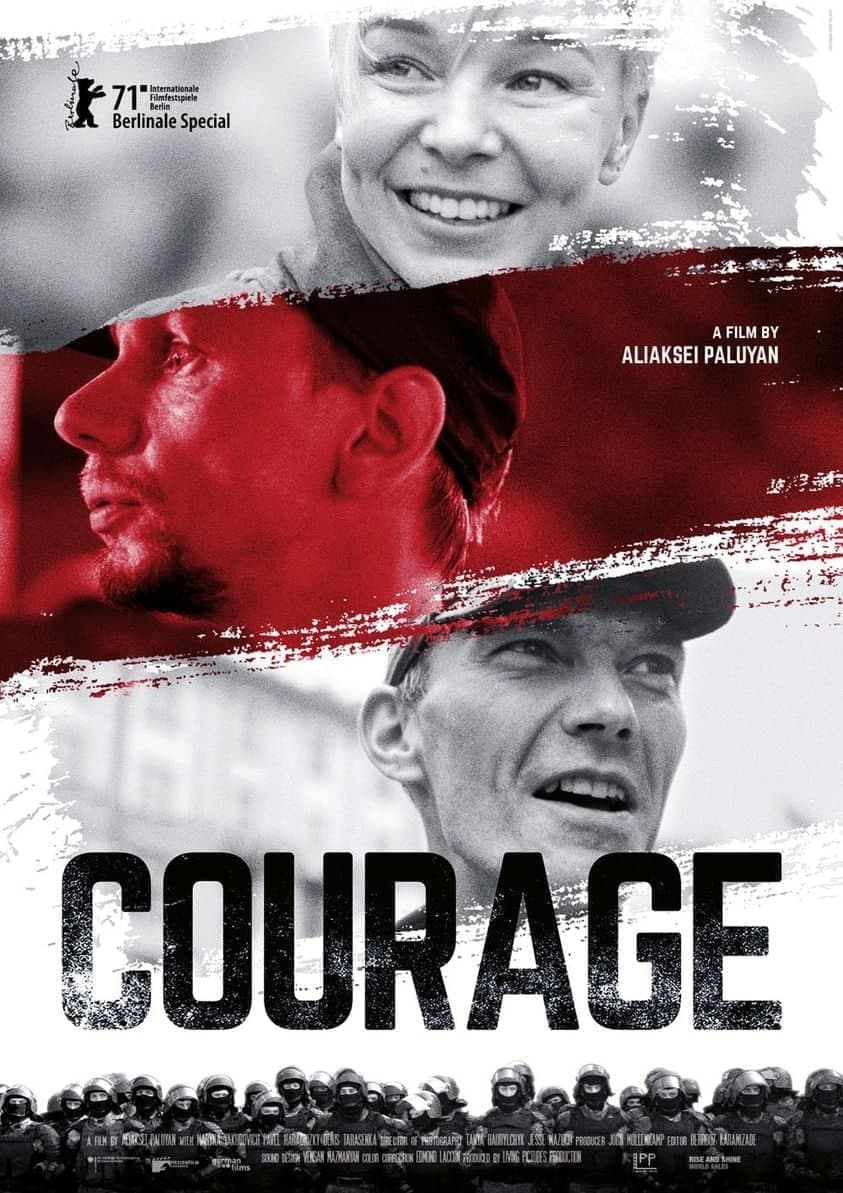 Ramana Abramčuk, musician, publicist and tour guide, made the first tourist route through the protest sites of Minsk.
Ramana Abramčuk, musician, publicist and tour guide, made the first tourist route through the protest sites of Minsk.
Alaksiej Pałujan’s documentary “The Drive” (about the “spirit of dignity that awoke in Belarusian society last year“) is in the program of the Berlin Film Festival – one of the largest in the world. The film will be presented in the Berlinale Special section.
The concert of the band VAL as part of the series Victory Artists took place on February 13 (the band was chosen to represent Belarus at the Eurovision Song Contest, but Belarusian state television and radio company terminated the contract with the duo due to their active civil position and participation in the protest).
To mark six months since the beginning of the peaceful protests of “women in white”, a clip off the poem by Hanna Komar “My Body” was released.
New pieces of art:
Volha Jakuboŭskaja’s new work for Maksim Znak; “Spring’s around” by Jury Ladzian; cactuss.art.
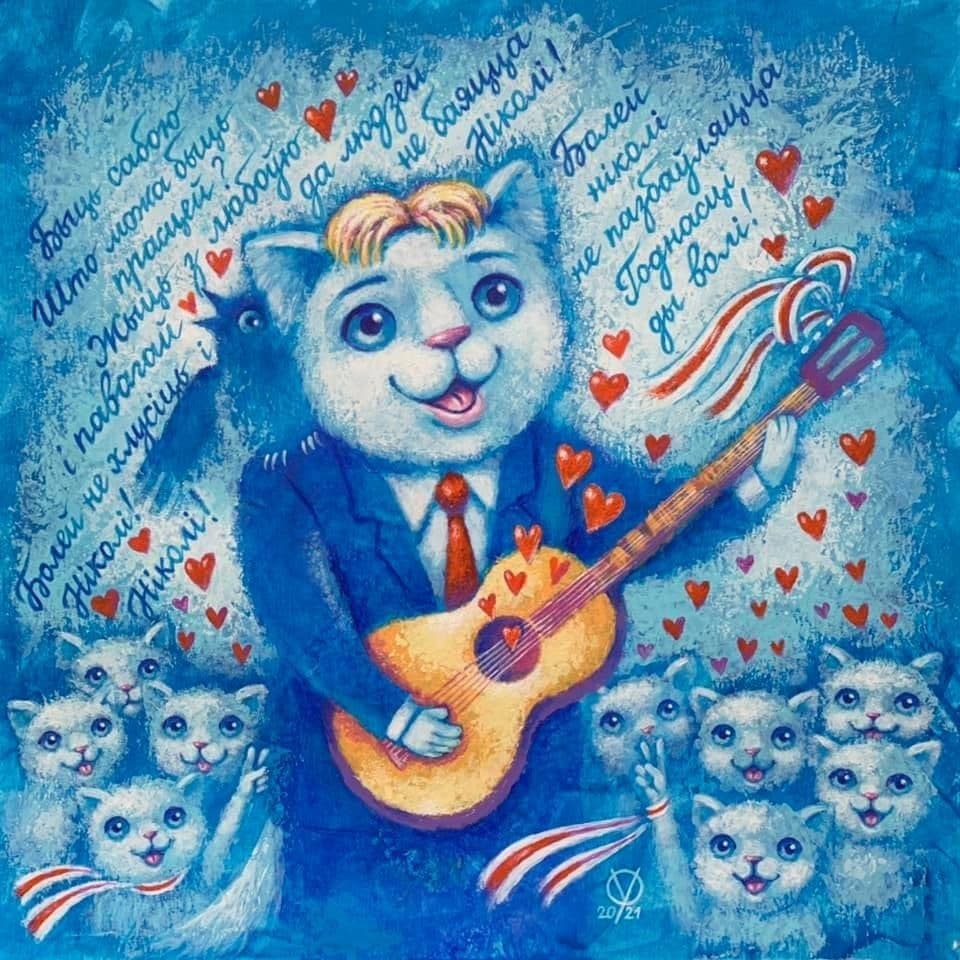
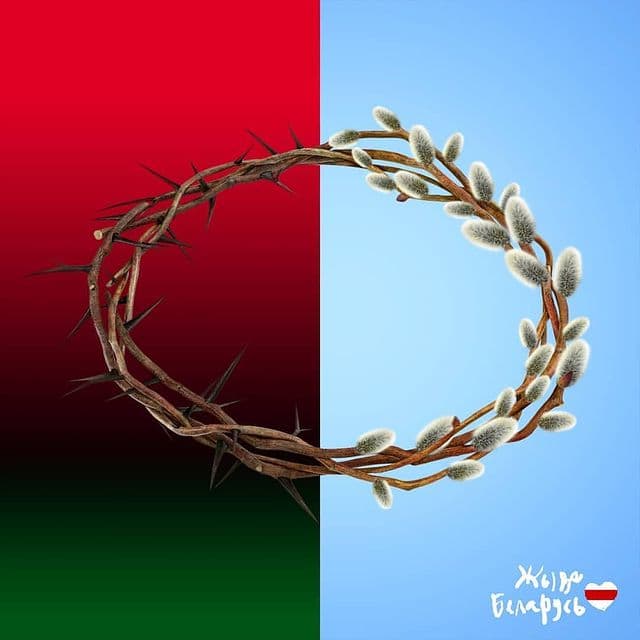
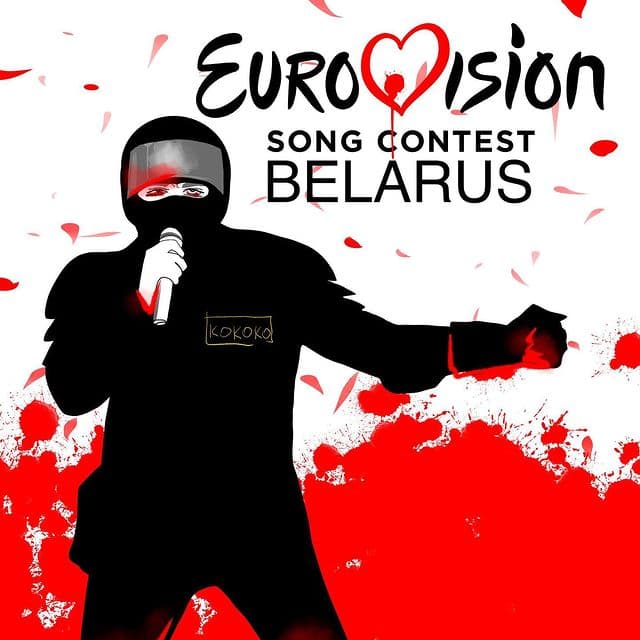
Voices of Belarusian Culture
Siarhiej Zakońnikaŭ, poet:
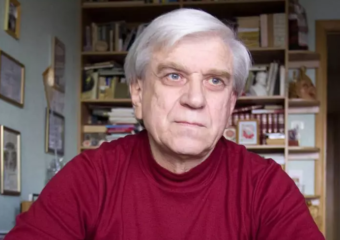
“In August 2020, my wife Lilia and I took part in four marches. Looking at the happy smiles of hundreds thousands of people, especially women, at the beautiful flags, emblems with Pahonia, it seemed to me that in those moments the soul of the nation returned to the country, the true unity came. But soon the bright days were obscured by the “black people.” Without dismantling the dictatorial system, there will be no unity in Belarus.”
Aliaksandr Kraŭcevič, Doctor of Historical Sciences, summed up the results of the six-month Belarusian protest:
“The result of six months of protest is the accelerated formation of the nation. But from the point of view of ethnic nationalists (in a good sense) the nation formation hasn’t been completed. This requires for the Belarusian culture and language to be widely spread”.
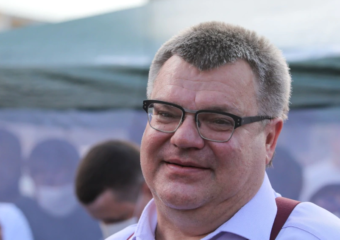
Viktar Babaryka, a patron of culture, former head of Belgazprombank, a candidate in 2020 presidential election, a political prisoner, gave an interview to Deutsche Welle from behind bars.:
“I would very much like to be worthy of such a people. Those who, despite all the injustice and cruelty, have kept their hearts pure. I realize that the last year has put forward a lot of young and worthy people who are quite capable of claiming the role of leader”.
Aleś Bialacki, human rights activist, member of the Belarusian PEN Center, former political prisoner and prisoner of conscience, laureate of the Aleś Adamovič Literary Prize (2014), on political repressions:
“Some prisoners may be released thanks to the pressure from the international community and for the simple reason that there are not enough places to keep such a large number of political prisoners. The fact is that in Belarus there are only 6 or 7 security prisons for first-timers, but you can’t drive so many political prisoners into a regular prison at the same time – they will break all the rules set by the administration. Unless, of course, you build a separate prison camp for political prisoners”.
International Solidarity
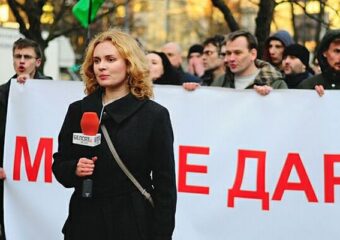
Kaciaryna Andrejeva is journalist, author (together with Ihar Iljaš) of the book “Belarusian Donbass” about the role of Belarus in the Ukrainian-Russian war, political prisoner who was detained on November 15 (along with the camerawoman Darja Čulcova) while streaming the brutal dispersal of the rally in memory of killed Raman Bandarenka, and is accused of organizing and preparing actions that grossly violate public order. As part of the international project of solidarity with political prisoners, the world-famous German philosopher Jürgen Habermas has become Kaciaryna’s “godfather”.
The Writers’ Association of the Austrian city of Graz has sent a letter to the Ambassador of the Republic of Belarus in Austria demanding the immediate release of Belarusian political prisoners and an end to violence and lawlessness.
An exhibition dedicated to Belarusian protest art opened in Tokyo on February 14 with the support of the Belarusian Association of Japan.
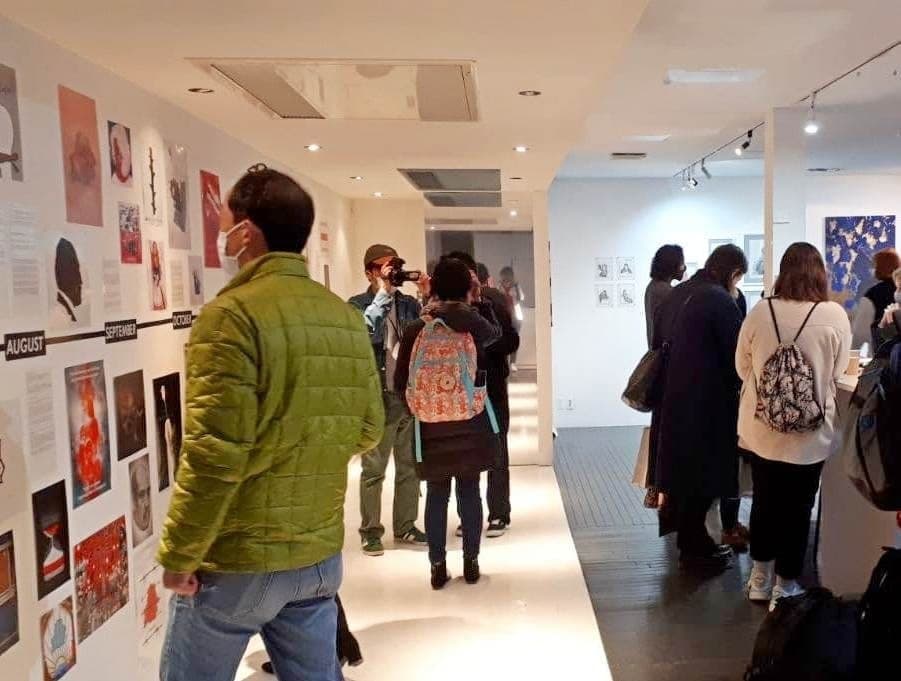
Olga Tokarczuk, a Polish writer, Nobel Prize Laureate 2018, has expressed support for the Belarusian women protesters:
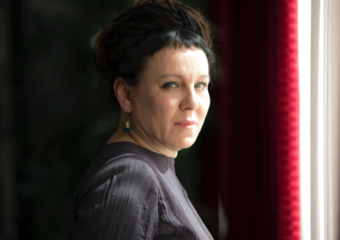
“I think of the Belarusian women politicians whose names have become a symbol of the fight for democracy and who are talked about all over the world. About the kidnapped Maryja Kaleśnikava, who tore her passport at the border to avoid deportation to Ukraine. About the forced immigration of Sviatłana Cichanoŭskaja and Vieranika Capkała. About Volha Kavalkova, who was deported to the border with Poland by force. But most of all, perhaps, I think of Svetlana Alexievich, an outstanding writer, Nobel laureate, also member of the Coordinating Council”.
Auction
Jaŭhien Smaryhin, Belarusian actor, director, screenwriter and TV presenter, former player of “KVN”, a Russian TV show featuring humor competition, has offered his team’s costume for an auction to support Belarusian cultural community.
“I really wish that humor and satire were able to break through the barriers of censorship and stupidity and help good to defeat evil.”
The legendary Belarusian rock band N.R.M. put up their rock crown for an auction to support repressed musicians.
Misselaneous
8 months ago a collection of paintings by Belgazprombank was arrested (150 paintings worth about $20 million). Since then, the paintings are still stored in the Art-Belarus gallery, and no investigative actions have been undertaken.
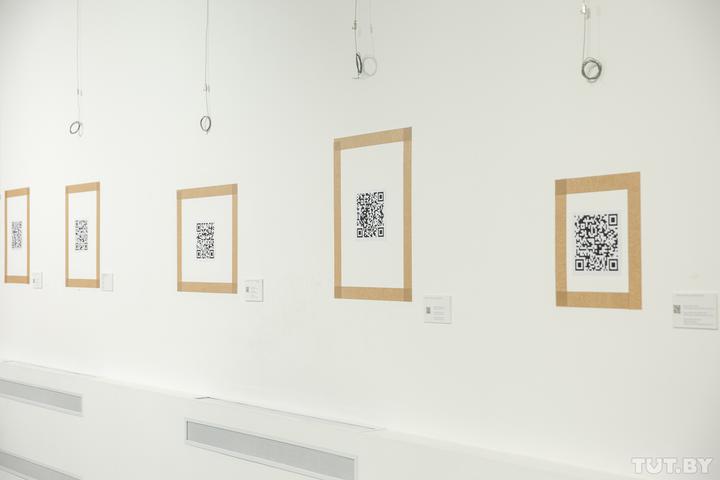
Download the pdf-version of issue 19 of Cultural Resistance Monitoring
